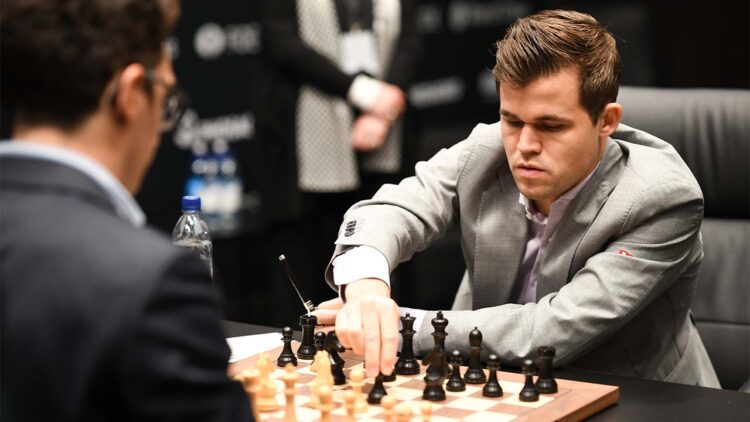Magnus Carlsen is a Norwegian chess player who is widely considered to be one of the greatest chess players of all time and believed by many to be the number one greatest player in the history of chess. He has been the World Chess Champion since 2013 and has a reputation for his exceptional intelligence.
Magnus Carlsen is a name that needs no introduction in the world of chess. He is a Norwegian grandmaster, and since 2013, he has been the World Chess Champion, holding the title for a record-breaking eight years. Carlsen’s rise to the top of the chess world has been nothing short of phenomenal, and he has redefined the way chess is played and perceived. In this article, we will explore the life and career of Magnus Carlsen, the undisputed king of chess.
Name: Magnus Carlsen
Nick Name: Mozart of Chess
Place of birth: Tønsberg
Date of birth: 30th November 1990
Federation: Norway
Title: Grandmaster
Update: Magnus Carlsen recently broke the record for longest streak of holding the #1 rank in Chess, surpassing Gary Kasparov longest consecutive streak, but not the total amount of time as #1. Carlsen still has another 10 years to go to exceed the record of beat Kasparov.
Biography
Magnus Carlsen is a chess prodigy who achieved the Grand Master level, when he was only 13 years old. He is currently the third youngest ever Grandmaster in the chess history. He reached peak rating of 2786, in 2008. Carlsen is currently number one in the world.
Early Life and Career
Carlsen started playing chess tournaments when he was eight. Carlsen initially trained under Simen Agdestein, a Norwegian Grandmaster. Carlsen became an International Master in 2003, when he was 13.
Magnus Carlsen was born in Tønsberg, Norway, on November 30, 1990. He started playing chess at the age of five and showed a remarkable aptitude for the game. His family was supportive of his chess interest, and by the age of eight, he was already a member of the Norwegian Chess Club. Carlsen’s talent was evident early on, and he quickly rose through the ranks.
At the age of thirteen, Carlsen became an International Master, and two years later, he achieved the title of Grandmaster. He continued to hone his skills and started to participate in high-level tournaments. In 2008, at the age of seventeen, Carlsen won the prestigious Corus Chess Tournament, defeating some of the top-ranked players in the world.
Carlsen impressed at European Under-12 Boys Championships in 2003, after finishing third. Carlsen grabbed the attention of chess world when he won the C group of Corus Chess tournament held at Wijk aan Zee where he scored 10.5 points from possible 13.
He achieved his first Grandmaster norm in that tournament. He won the penultimate match of that tournament in just 29 moves and he won the audience prize for his performance in that match.
Carlsen continued his impressive run by achieving his second Grandmaster norm at the Aeroflot Open held at Moscow, in 2004.
Carlsen also overcame Anatoly Karpov at the Reykjavik Blitz Chess tournament in 2004.
In rapid knock out tournament he drew one and lost the other game against legendary Garry Kasparov.
Carlsen achieved his third and final Grand Master norm at the Dubai Open Chess championship, in 2004.
Carlsen created history, when he featured in the 2004 FIDE World Chess Championship, as the youngest ever participant. Carlsen came close to a title win at Norwegian chess championship. However, he finished runner up to Berge Ostenstad.
At the Ciudad de Leon Chess tournament, Carlsen featured in the semi-final against then world number two, Viswanathan Anand. Carlsen again finished runner-up at the Norwegian Chess Championship after losing to Agdestein, in 2005. Carlsen had an impressive run at the 2005 World Chess cup held at Russia.
Carlsen reached the pre-quarter final stage. He went out of the tournament after losing to Evgeny Bareev with a score line 1.5-2.5.
Carlsen finished 10th and placed in the candidate tournament for World championship and also created history again by becoming youngest ever World Championship candidate.
Notable Achievements
Carlsen achieved his first senior level success when he won Arnold Eikrem Memorial tournament, in 2005. He finally succeeded in clinching the Norwegian Championship in 2006.
Carlsen continued his impressive run as he went on to clinch Glitnir Blitz Tournament in 2006.He had an impressive run in 2006 Chess Olympiad as he defeated higher ELO rated players.
Carlsen finished runner-up at the Biel/Bienne grandmaster tournament and NH Chess tournament in that year and finished eighth at the World Blitz Championship held in Israel.
Carlsen finished second at the Linares Chess Tournament in 2007. He finished eighth at the Melody Amber Blind and Rapid chess tournament. Carlsen created history to be the youngest ever to win chess tournament, which comes under category 18, when he finished first at the 2007 International Chess festival Biel Grandmaster tournament. Carlsen made it to the semi-final stage at the 2007 World chess cup.
Carlsen again created history when he became the youngest ever to win prestigious category tournament, as he finished first at Corus Chess tournament, in 2008.
Carlsen finished as runner up at the 2008 Linares Chess tournament. Carlsen shared the runner-up sport at the 2008 Melody Amber blind and rapid tournament. He shared first place at the 2008/2009 FIDE Grand Prix, a 2011 World Chess Championship qualifying tournament.
Carlsen finished as runner up at the category 21 tournament Bilbao Masters in 2008.In 2009, Carlsen finished second at category 21 tournament M-Tel Masters.
Rise to Fame
Carlsen’s success continued, and in 2010, he became the youngest player ever to reach the number one ranking in the world. He also won the Biel Grandmaster Tournament and the Nanjing Pearl Spring Chess Tournament, among others.
In 2013, Carlsen faced reigning world champion Viswanathan Anand in the World Chess Championship, held in Chennai, India. Carlsen won the match convincingly, becoming the new world champion and ending Anand’s five-year reign. Carlsen’s aggressive and dynamic playing style, combined with his exceptional positional skills, made him a formidable opponent, and he quickly became the face of modern chess.
Carlsen defended his title successfully in 2014, defeating Anand once again. In 2016, he faced Sergey Karjakin in the World Chess Championship, which was held in New York. After a tense match, Carlsen emerged victorious, winning the tiebreakers and retaining his world championship title.
In 2018, Carlsen faced Fabiano Caruana in the World Chess Championship held in London. After twelve drawn games, the match was decided in the rapid tiebreakers, which Carlsen won convincingly, securing his fourth world championship title.
Playing Style
Carlsen is known for his aggressive and unorthodox playing style. He is a master of positional chess and excels in endgames. Carlsen’s ability to create and exploit weaknesses in his opponents’ positions is unparalleled. He is also a formidable blitz and rapid player, and his quick thinking and accurate calculations make him a formidable opponent in these formats.
Carlsen’s approach to the game is unconventional, and he is known for taking risks and playing aggressively, even in positions that appear equal. He is not afraid to go for sharp lines and often creates complex positions where his opponents are forced to make mistakes. Carlsen’s playing style has redefined the way chess is played, and his dynamic approach has made the game more exciting and accessible to a broader audience.
Beyond Chess
Apart from chess, Carlsen is a keen football fan and supports the English football club Tottenham Hotspur. He has also been involved in several charitable initiatives, including the Play Magnus app, which aims to promote chess among young players worldwide.
Carlsen’s rise to the top of the chess world has been nothing short of phenomenal. He has dominated the game for the last decade and has shown no signs of slowing down.
Magnus Carlsen’s IQ
While there is no official record of Magnus Carlsen’s IQ, some sources suggest that it is around 190. This would make him one of the most intelligent people in the world, as the average IQ is around 100.
It’s worth noting, however, that IQ tests are not universally accepted as a reliable measure of intelligence. Many factors can influence IQ scores, such as cultural background, education, and personal experience. Additionally, IQ tests only measure a narrow range of cognitive abilities and do not take into account other important factors such as creativity, emotional intelligence, and social skills.
Despite this, it’s clear that Magnus Carlsen possesses exceptional cognitive abilities. His success in the highly complex and strategic game of chess is a testament to his intelligence and analytical skills. He has also shown an aptitude for mathematics and has been known to solve complex problems quickly and accurately.
While Magnus Carlsen’s exact IQ is unknown, there is no doubt that he is an exceptionally intelligent individual. His achievements in the world of chess and his impressive cognitive abilities are a testament to this.
It’s worth pointing out that chess players do not need a high IQ to be great at the game. Many top players do have abnormally high IQ scores, but there are also players that have reached the Grandmaster level with a below average IQ.
Conclusion
In conclusion, Magnus Carlsen is a true icon in the world of chess. His natural talent, tactical abilities, and creative style of play have set him apart from his competitors and have earned him a place in the pantheon of chess greats.
With several years of competitive chess still ahead of him, it is likely that Carlsen will continue to dominate the sport and inspire future generations of chess players around the world.
If you’re interested in learning more about the World Champion, there is a list of interesting facts about Magnus Carlsen that most people don’t know.





